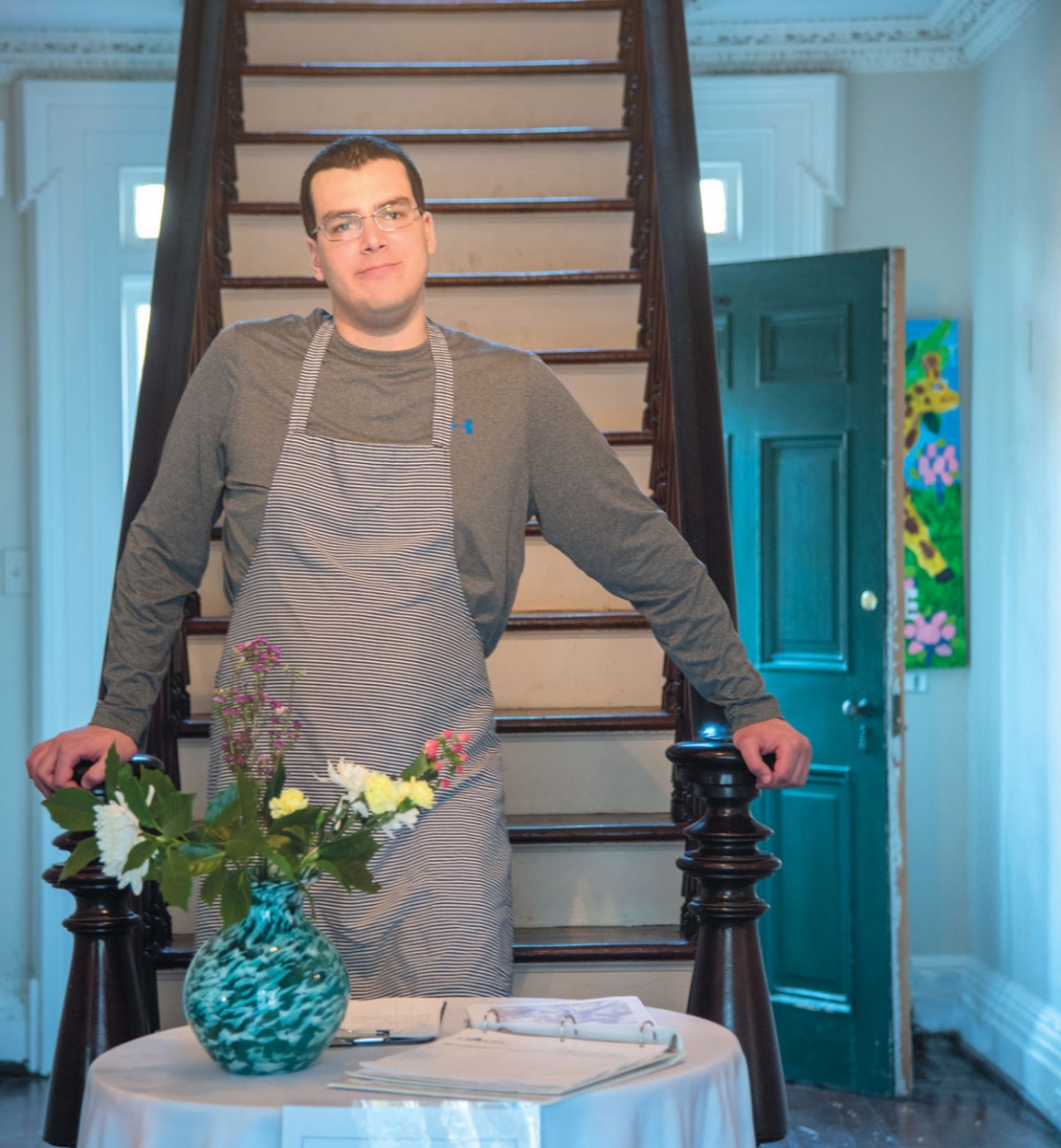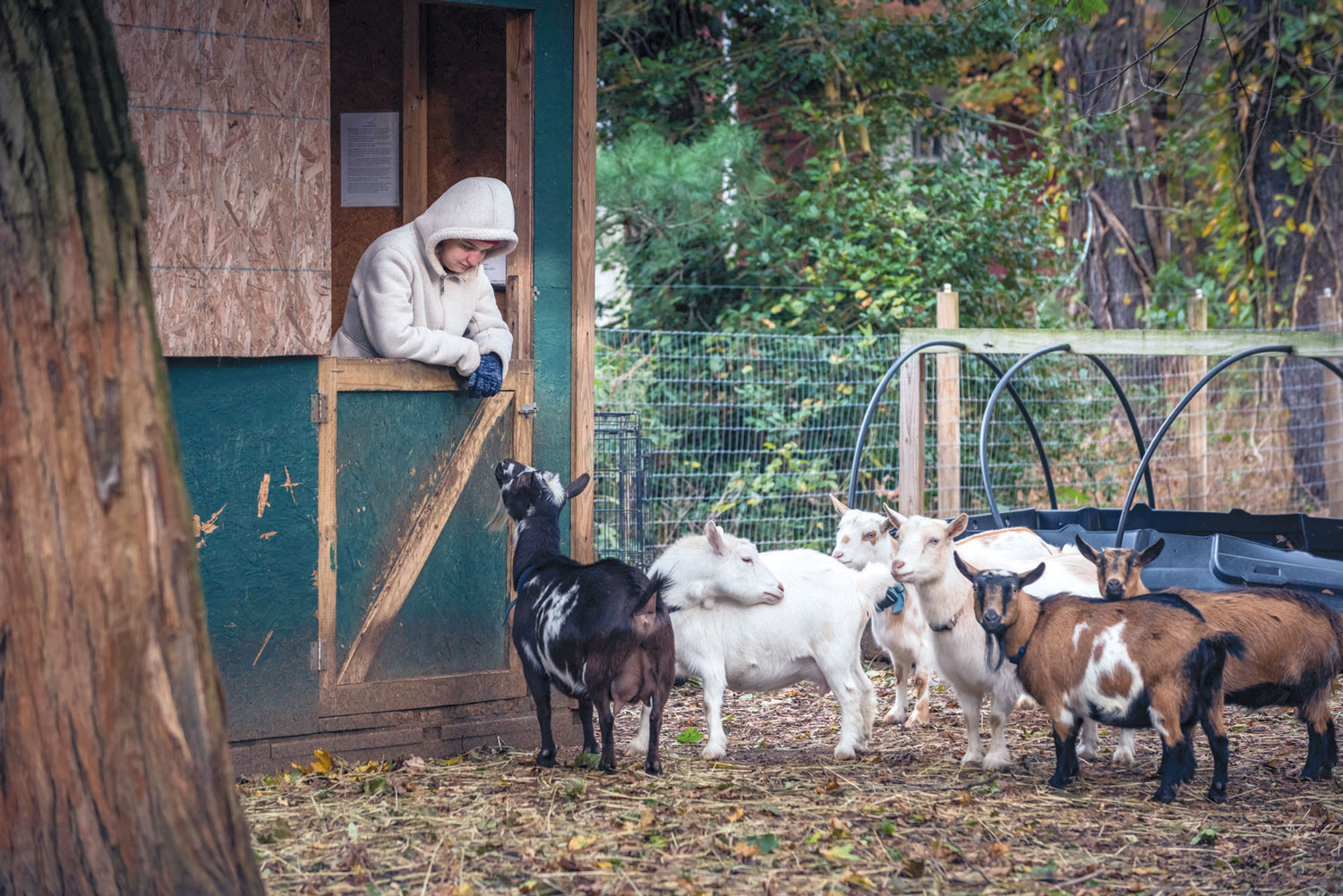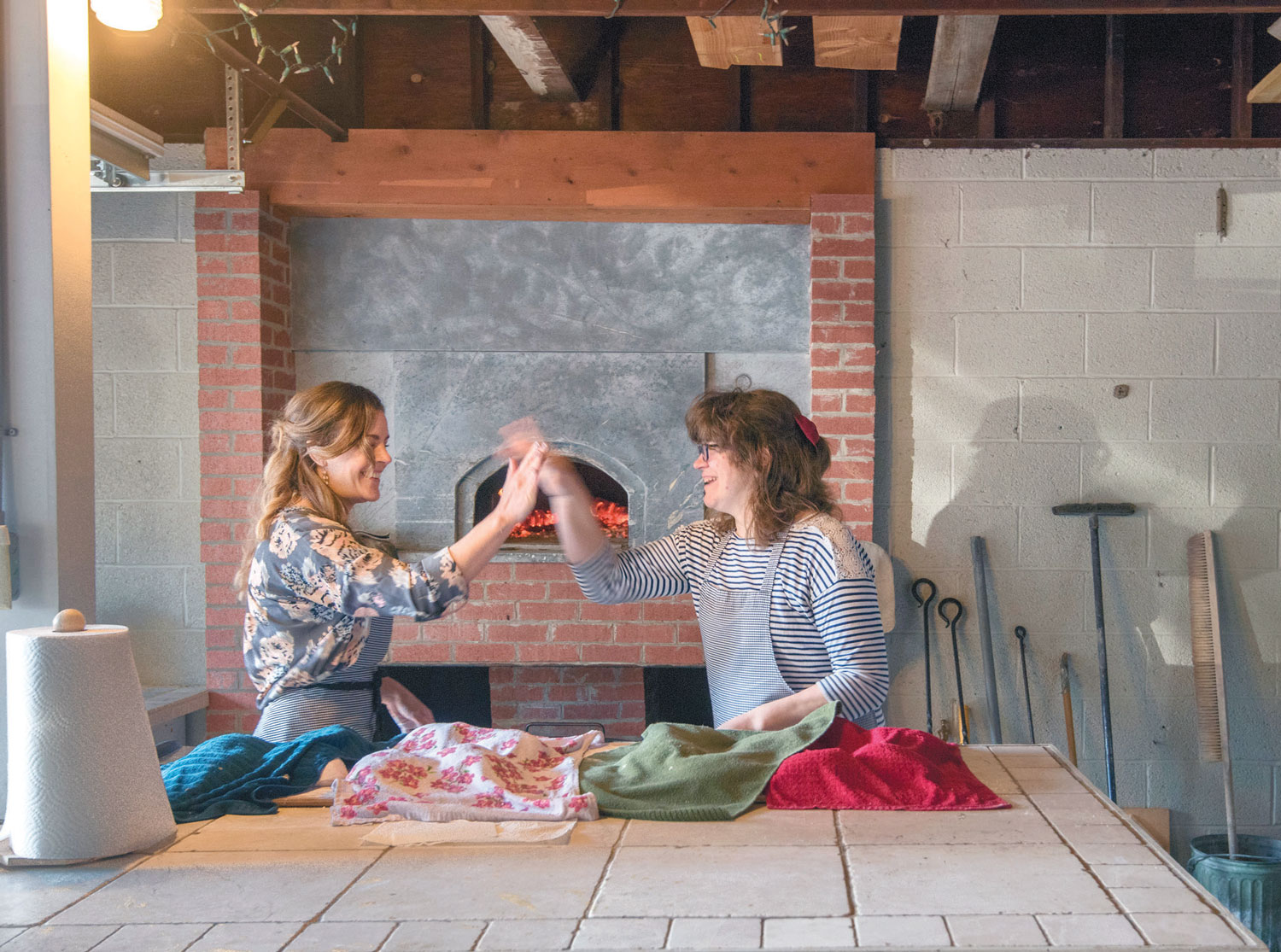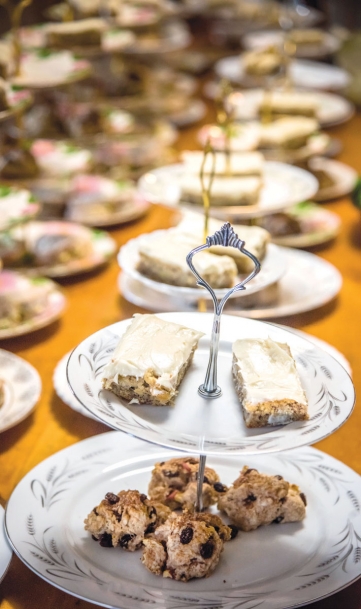Oasis Farm
A Unique Learning Environment for Adults with Autism
The clink of china tea cups on saucers punctuates the murmur of conversation during afternoon tea at the Oasis farmstead in Middletown.
Tables draped in white are topped by vases of purple and yellow flowers. Customers admire patterns on the china, some with dainty blossoms, others with dramatic gilding.
The wait staff brings each customer a china tea pot, filled with Earl Grey, Vanilla Chai or Chamomile Mango tea. Then come the sandwiches and sweets, arranged on three-tiered serving trays, and tidbit bowls filled with homemade jam and clotted cream.
It’s like any other fancy tea, except for a few things.
First of all, the food is made on location, mainly from ingredients produced on the Oasis farm. The bread is baked that morning in a wood-fired oven, from flour freshly ground in the kitchen, from grain grown on the farm. Goat cheese comes from milk from the herd at the farm. The arugula was picked from beds in the farm’s geodesic greenhouse.
Secondly, it’s a bargain: a $10 suggested donation for “Scrumptious Sweets” or $15 for a “Flavorful Feast.”
And last, but certainly not least, the tea is planned, hosted, prepared, served and cleared away by young adults with autism.
“It truly is a community within itself. The staff and student interns work together as a team.” —Mai Cleary, founder and president of Oasis tlc
Oasis tlc is a non-profit organization that serves adults with autism, providing them with meaningful skills and satisfying work on a farm, while adhering to environmentally sound practices. Some of the student interns live in the stately white farmhouse with green shutters, a landmark on Sleepy Hollow Road. Others are day students. Both groups benefit from the natural beauty and peaceful environment of the farm.
But they do not live a cloistered life. Rather, a key component to the farm’s operation is community outreach. The students have performed volunteer work at Soul Kitchen, the pay-what-you-want restaurant in Red Bank founded by Jon Bon Jovi, and at Lunch Break, a soup kitchen and food pantry in Red Bank.
The students also strive for positive community interaction, seeking opportunities to mingle with the public on their own turf. The biweekly “Social Graces Tea” proves a perfect fit. The formality and civility associated with afternoon tea is something that can be enjoyed by people with autism and the community at large.
This type of programming is known as “reverse mainstreaming,” in which the general public is invited to interact with the autistic community, rather than the other way around.
“It is an important social skills learning tool,” says Mai Cleary, founder and president of Oasis tlc. “People with autism have a very hard time communicating face-to-face with people.”
In a setting such as a tea service, Cleary says, “there is a real purpose for communicating and also it is a somewhat scripted socialization that they can practice and therefore be successful at it. Success leads to motivation to try again and hopefully being able to do in outside situations. It also builds self-esteem, confidence and a feeling of being part of the world.”
“The ritual is perfect for our students,” Cleary adds, while noting, “but it is important to continuously add, change things within the vocational zones that help our students be more flexible and OK with change.”
Autism is a complex disorder that involves developmental disabilities and a broad spectrum of symptoms and conditions. Some of the behaviors associated with autism include delayed learning of language, difficulty making eye contact or holding a conversation, difficulty with executive functioning, which relates to reasoning and planning; narrow, intense interests; poor motor skills and sensory sensitivities, according to the Autism Society, a non-profit advocacy organization.
Genetic and environmental factors can lead to autism, but there is no single cause and there is, as yet, no cure.
The rate of autism among American children is 1 in 68, according to the Centers for Disease Control and Prevention [CDC]. That ratio is based on the CDC’s evaluation of health and educational records of 8-year-old children in 2012 in 11 states, including New Jersey.
New Jersey has the highest rate of autism of all the states in the study: 1 in 41. However, experts believe this may be because of differences in how children are diagnosed and treated from state to state.
Oasis tlc was founded as a sister organization to IMPACT, a non-profit advocacy group started by Middletown parents as a way to support the school district’s autism services. Oasis tlc focused on the needs of young adults with autism, after they age out of public education services at 21.
Cleary and her husband, John, have a grown son, also named John, who has a high-functioning form of autism.
“We did not develop Oasis for John,” Cleary says. “We thought he would be beyond this, more independent and able to work. Autism is tough, though. When we started the program and we needed a fourth resident we asked him to do it for us so we could get the program up and running. Right away we saw a change in him that we did not expect. He was relieved and so happy to be with people like himself.”
Cleary had long envisioned a farmstead community for adults with autism. The first such farm in the United States was Bittersweet Farms in Whitehouse, Ohio, founded in 1983.
A capital campaign enabled Oasis tlc to purchase the 18th-century Coe Estate on Sleepy Hollow Road in 2011. The farmhouse sits on a 26-acre tract that consists of farm land owned by Oasis and public land owned by the state, county and township. The property feels very much like an oasis from suburban noise. A breeze rustles the needles on towering evergreens. Chickens chatter in a fenced-off patch of land. And the boards on the front porch give a welcoming creak as visitors come in for tea.
“Hello, ladies! Welcome to our tea service,” Chris Freda says, standing behind a small table in the foyer. He is a student intern, working as host of the tea. “Can you please sign in?”

Student interns, as they are known at Oasis, do not age out of the program. They begin in the transitional program, learning vocational skills in agriculture, environmental studies, food preparation and the arts. If they show aptitude and there is a job available on the farm, they can then be hired, and are referred to as first apprentices.

To the right is the Lafayette Ballroom, where the teas are held. Framed artwork by the students hangs on the walls. Twin fireplaces anchor the room. The wide-planked hardwood floor gleams. Above, the ceiling is edged with elaborate molding, as frothy as anything you’d find on a wedding cake. Daylight pours through windows, and 19th-century chandeliers add a warm glow.
It is said that the room was added to the 1700s farmhouse in preparation for a party to honor the Marquis de Lafayette, the French general who was a key ally to George Washington, in celebration of the 50th anniversary of the American revolution. They literally raised the roof for Lafayette, adding the ornamentation to the ceiling as a flourish.
Imagine the contrast between the Lafayette Ballroom and an ordinary warehouse, filled with an echoing clatter as workers sort through bins of clothes hangers.
Separating clothes hangers was one of the disheartening options presented to Diane Guarillio Begley of Middletown as she searched for a program for her 23-year-old daughter, Melissa, who has autism.
“It was all monotonous work,” Begley recalls. “I couldn’t see her doing it for eight hours a day, but there really aren’t a lot of options.”
“If you met Melissa,” Begley says, “you would be completely impressed with her vocabulary and grammar skills. Like, the things that people text and put on Facebook would make her nuts. She’s also very sympathetic and empathetic, and funny.”
“But she’s very immature,” Begley says. “She carries a Minnie Mouse doll everywhere and watches “Sesame Street.” She doesn’t outgrow anything. She looks, on paper, very high functioning, but she’s really seven years old.”

Alicia Caffrey
Melissa began attending Oasis as a day student in January 2017. She enjoys the sewing and art workshops most of all, but she also has surprised her mom by enjoying yoga.
“She wouldn’t go to a yoga class normally,” Begley says. “I think it’s just that it’s such a relaxing atmosphere there. It’s such a routine now, and she’s so driven by schedule, so now she loves all of it.”
“When I think how far she’s come in a year, it’s amazing,” Begley says. “They told me Melissa was cleaning the bathroom one day. I was like, “Melissa was cleaning the bathroom?”
Currently there are four residents at the Sleepy Hollow farm, with two more spots that Cleary expects to fill in September, and three residents at a second property nearby, known as Navesink Farm, which has room for at least three more. Fifteen day students also come to Oasis.
Oasis does not maintain a waiting list, but Cleary says families are encouraged to re-apply if they are not accepted in a given year.
Student interns, as they are known at Oasis, do not age out of the program. They begin in the transitional program, learning vocational skills in agriculture, environmental studies, food preparation and the arts. If they show aptitude and there is a job available on the farm, they can then be hired, and are referred to as first apprentices.
All programming is designed to introduce student interns to vocational skills in a way that complements their abilities. Time management is key. Cleary says her staff makes sure each task is approached with a clear goal in mind and a specific amount of time allotted for it, with set-up and prep work done by staff before the student interns begin working, so that they can get the most from their time.
Barbara D’Augusta, who serves on the board of directors for Oasis and whose son, Thomas, is a day student, says that Oasis adjusts expectations to accommodate each student’s needs and abilities.
For some students, she says, “you have to budget your energy for the day. Maybe four hours is it for you, and we’re good with that.”
“We have to create that niche,” D’Augusta says, “because they’re not going to have the traditional jobs.”
Before the tea can be served in the afternoon, student interns are busy all morning. They bake bread in a wood-fired oven in the garage and scones in the kitchen. Banana bars are frosted with cream cheese icing. They take pains to fill tiny sandwiches with egg salad, or cucumber, cream cheese, avocado and dill, or with goat cheese, arugula, red onion and fig reduction. Rows of tiered trays await delivery to tables.
Later, in the Lafayette Ballroom, as customers finish their tea and leave their tables, two young men enter the room with trays, humming musical noises as they carefully stack the cups, saucers and plates.
Begley says the camaraderie has been a key benefit to her daughter.
“Melissa acts like her peers and the staff are all her friends,” Begley says. “She doesn’t treat it as a place where there are teachers and students, not a place where people are telling her what to do.”

Staff member Kaylin Torres receives a high five from Rikki Blood
One student intern, Rikki Blood, seems especially adept at helping her peers. She checks on other tables, and fetches a small pitcher of milk for a customer.
D’Augusta and Liz Smith, another member of the board of directors, notice Blood’s efforts at the tea, and say that the young woman is an “upper classman,” someone who has been with Oasis for five years. And in that time, they have seen her confidence grow.
Cleary says this happened with her son, too, who made friends with his peers and also “felt good about being able to help others more autistic than himself.”
“We have seen this in all our students,” she says. “They have status amongst each other and our employees. It truly is a community within itself. We are so happy about this outcome and it is so important to our success. The staff and student interns work together as a team.”
Socialization and new skills help these young adults feel something that many people take for granted: satisfaction in how their time is spent.
“There’s something about knowing, at the end of the day, that you have put in a day’s work,” D’Augusta says. “That feels good.”
OASIS TLC
1 Morgan Road, Middletown
908.601.6158
oasistlc.org




